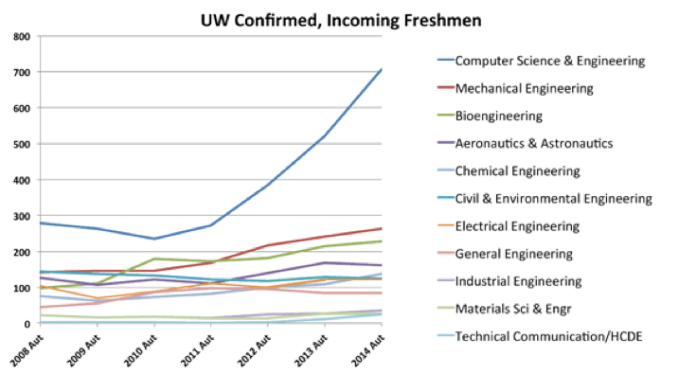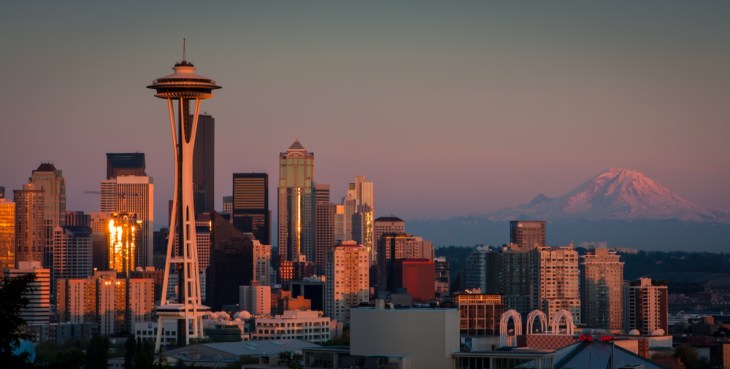Editor’s note: Anne Seckinger is a writer interested in the intersection of technology and business.
The stories of Silicon Valley millennials competing, succeeding and failing spill out of the region faster than most journalists can type. The region excels in churning out startups, thanks to the abundance of venture capitalists, the plethora of reporters and the proximity of like-minded techies.
The term “Silicon Valley” is practically synonymous with “tech startup” because startups are the business of Silicon Valley, and entrepreneurs are the output. However, companies that make the greatest impact disrupt present-day societal expectations and norms; the allure of startups is that they dare to surprise and challenge consumers. Thus, how disruptive in the market is it to launch a startup in Silicon Valley when the environment is designed to produce entrepreneurs?
Many technology professionals from across the world relocate to Seattle because of the city’s potential to reward daring ventures, not because they seek to follow Silicon Valley’s well-tread blueprint. Since Seattle’s economy is not wholly dependent on the presence of startups, beginning a company in Seattle is far more courageous than beginning a company in Silicon Valley. Yet, Seattle is not a reckless gamble at tech roulette. The city is home to tech giants Amazon, Boeing and Microsoft, all companies with skilled employees that rival Silicon Valley’s Google, Facebook and Yahoo (the three of which also have a staked presence in Seattle).
Additionally, Seattle’s thriving tech industry is not limited to these well-known organizations. Examples of smaller tech companies based in the Seattle area include Zillow, Tableau, INRIX, PicMonkey, Spoon.net and Moz. Seattle is not another Silicon Valley because the roadmap for a young company in Seattle is promisingly unpredictable.
Growing a Tech Presence
Seattle has shown steady growth regarding high-tech startup density per metropolitan area. While the Ewing Marion Kauffman Foundation interestingly observed that all of the top 10 cities with the highest tech startup densities in 2010 were also in the top 20 in 1990, Seattle increased its standing the most over the 20-year period.

Seattle’s presence on the top 20 list for the past two decades suggests a significant conclusion: Seattle has been established as a tech hub since before the 1990s, and it has done so without emulating Silicon Valley’s formula. In Seattle, entrepreneurs are able to steadily find success without being surrounded by an ecosystem reliant on startups.
Furthermore, according to the US Census Bureau, Seattle grew faster than any other major American city between July 1, 2012 and July 1, 2013. The Greater Seattle Area has a population of roughly 3.8 million people, making Seattle now the 23rd most populous city in the U.S. Silicon Valley is comparable in size with a population of between 3.5 to 4 million people, depending on the geographic communities attributed to the region.
Increasing Diversity in Seattle’s Tech Industry
In light of the recent scrutiny Silicon Valley companies have received over employee diversity, Seattle must also be examined. Seattle is not flawlessly diverse, but it possesses many signs of progression.
Seattle ranked as the third best city for female entrepreneurs in a 2014 study conducted by Nerd Wallet, preceded by Washington D.C. and San Francisco. (The aforementioned young Seattle company, Moz, is led by female CEO Sarah Bird).
Both Seattle’s and Silicon Valley’s tech industries are largely dominated by Caucasians and Asians. As a result, local Seattle universities and organizations such as the University of Washington and Microsoft have programs specifically geared toward further diversifying the field of computer science. Some institutions in Silicon Valley host similar programs, but Seattle’s efforts seem to stem less from recent public pressure. Lastly, Seattle has districts often noted as some of the most diverse neighborhoods in the country.
Educating a Technical Workforce
Seattle is home to one of the most well-educated populations in the United States, with significantly more than 50 percent of the population holding a bachelor’s degree or higher. Stanford University is lauded as the mother of Silicon Valley, and deservedly so. However, the steep tuition and exclusivity of private institutions can inhibit less affluent applicants. The University of Washington offers Seattleites an affordable, public institution solution to higher education in technology.
The University of Washington’s Computer Science & Engineering program is consistently considered one of the top 10 CS programs in the United States. The school enrolls about 40,000 students across its three campuses, with CS engineering among the university’s most popular majors.

The quality of the Computer Science & Engineering program has increased the pool of qualified job candidates for the local tech industry. The University of Washington rivals Stanford’s influence on rising tech startups, but without disadvantaging lower-income students.
Seattle is a smart and courageous choice for tech entrepreneurs. Seattle’s growth, diversity efforts, and educated population prove that it is not a new Silicon Valley, but a modest tech mecca poised for innovative startups. Technology has an established presence in the Northwest city, but the region is not dependent on it. If tech entrepreneurs dare to leave the comfort of Silicon Valley, Seattle is a promising alternative.
